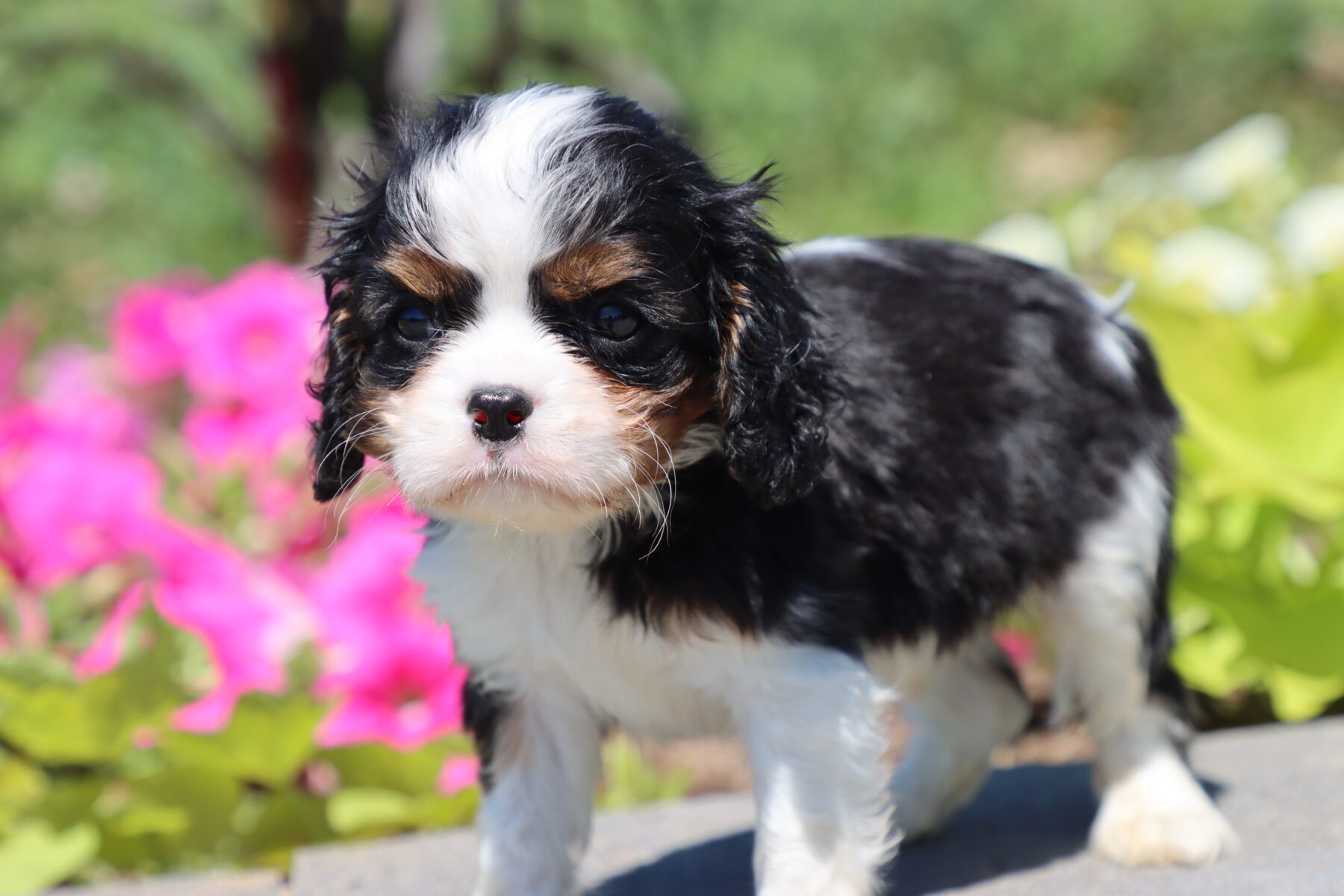
Cavalier King Charles Spaniels are cherished by people all over the country for their affectionate nature and charming personalities. Their popularity as a breed continues to soar, thanks to their adaptability, playful demeanor, and loving companionship.
However, before you decide to bring one of these splendid animals into your home, it’s crucial to understand their temperament. Knowing what to expect can help ensure that you and your new furry friend are a perfect match. Here at Carlisle Cavaliers, we want to provide you with an in-depth look at the temperament of Cavalier King Charles Spaniels, offering valuable insights for prospective owners to make informed decisions.
First, it’s important to get to know this lovely breed:
History and Background
The Origins of the Cavalier King Charles Spaniel
The Cavalier King Charles Spaniel has a rich history that dates back several centuries. Originating in the United Kingdom, these dogs were named after King Charles II, who was known to adore the breed. Their history is intertwined with royalty, as they were often seen in the laps of kings and queens.
This regal background has influenced their temperament, making them naturally affectionate and eager to please. Historically, these dogs were bred to be companions, and their role as lapdogs has instilled in them a profound sense of loyalty and attachment to their owners. Their small size and endearing appearance only add to their charm, making them a favorite among aristocracy and common folk alike.
Evolution of Temperament Traits
Selective breeding over the years has played a significant role in shaping the temperament of modern Cavalier King Charles Spaniels. Initially bred as companion dogs, their primary purpose was to provide comfort and companionship to their owners. This selective breeding has enhanced traits such as loyalty, affection, and sociability.
While the historical Cavaliers were slightly different in appearance, the core temperament traits have remained consistent, evolving to meet the needs of contemporary families. Modern Cavaliers are known for their gentle disposition and adaptability, traits that have been refined through generations of careful breeding. This evolution has ensured that the breed remains true to its roots while being well-suited to modern living environments.
General Temperament Traits
Affectionate and Loving Nature
One of the defining traits of the Cavalier King Charles Spaniel is a strong attachment to their owners. They thrive on human interaction and are happiest when they are with their family. This affectionate nature means they are often found snuggling on laps or following their owners around the house. Their need for companionship impacts their behavior, making them incredibly loyal and loving pets.
Cavaliers are often described as “Velcro dogs” because they love to be close to their humans at all times. This attachment can lead to separation anxiety if not managed properly, highlighting the importance of providing them with a secure and loving environment.
Playfulness and Energy Levels
Cavaliers have a playful nature that endears them to both children and adults. They enjoy engaging in various activities, whether it’s playing fetch in the yard or going for a leisurely walk. Despite their playful demeanor, their energy levels are moderate, making it easy to balance playtime with rest.
Ideal activities for Cavaliers include short walks, interactive toys, and gentle play sessions that keep them physically and mentally stimulated. Their playful antics and eagerness to engage in games make them wonderful companions for active families. However, they are equally content to curl up next to you on the couch, making them adaptable to different lifestyles.
Socialization and Friendliness
Inherent friendliness is another hallmark of the Cavalier temperament. They are known to be sociable dogs that get along well with strangers and other animals. Early socialization is crucial to nurture this trait, ensuring they grow up to be well-adjusted adults.
Introducing your Cavalier to different environments, people, and pets from a young age can significantly enhance their social skills. Effective socialization tips include positive reinforcement, regular exposure to new experiences, and gentle encouragement. Cavaliers are generally not aggressive, and their friendly nature makes them excellent therapy dogs. Their ability to form bonds with various people and animals is a testament to their sociable and adaptable nature.
Temperament in Different Environments
Cavaliers in Family Settings
As gentle and affectionate dogs, Cavaliers excel in family settings. They interact well with children and adults alike, often forming strong bonds with all family members. Their playful yet calm demeanor makes them suitable for families with young children, as they are patient and tolerant.
There are many benefits to having such a dog in a family environment, including unwavering loyalty, endless affection, and a joyful presence that enriches family life. They are known to be very tolerant of children’s antics, making them great playmates. Their loving nature ensures that they are not just pets but integral members of the family, bringing warmth and joy to the household.
Cavaliers and Other Pets
Another positive trait for Cavalier King Charles Spaniels is they’re friendly. They generally get along well with other animals, making them a great addition to multi-pet households. Introducing a Cavalier to existing pets should be done gradually and with care. Supervised introductions, positive reinforcement, and allowing each pet to adjust at their own pace can help foster harmonious relationships.
Cavaliers are known for their gentle disposition, which often translates to peaceful coexistence with other pets. Whether you have cats, other dogs, or smaller animals, a well-socialized Cavalier can integrate seamlessly into the household, enhancing the overall harmony.
Adaptability to Living Situations
Cavaliers are highly adaptable dogs that can thrive in various living environments, whether it’s a spacious house or a small apartment. Their moderate size and calm demeanor make them suitable for urban living, provided they get enough exercise and mental stimulation.
You can help make them comfortable by providing a safe and cozy space for them to retreat to, ensuring regular exercise, and maintaining a consistent routine. Cavaliers are known for their flexibility and can adjust to different living conditions as long as their basic needs are met.
Training and Behavior
Trainability of Cavaliers
Cavalier King Charles Spaniels are known for their eagerness to please, which makes them relatively easy to train. Their intelligence and willingness to learn are assets during training sessions. Effective training methods include positive reinforcement, consistency, and patience. Using treats, praise, and gentle corrections can help reinforce desired behaviors.
Common training challenges may include housebreaking and managing their natural curiosity, but these can be overcome with persistence and routine. Cavaliers respond well to training that is consistent and positive. Their eagerness to please means that they thrive on praise and rewards, making training a bonding experience for both the dog and the owner.
Behavioral Issues
While Cavaliers are generally well-behaved, they can exhibit certain behavioral issues if not properly trained and socialized. Common issues include separation anxiety, excessive barking, and over-attachment.
Preventing and managing these behaviors involves providing adequate mental and physical stimulation, establishing a routine, and gradually acclimating them to being alone for short periods. Consistent training and early intervention are key to addressing any behavioral concerns. Cavaliers are sensitive dogs, and their behavior can be influenced by their environment and the treatment they receive. Addressing behavioral issues promptly and with care ensures that they grow into well-adjusted adults.
Importance of Consistent Routine
Establishing a daily routine is crucial for Cavalier King Charles Spaniels, as it provides structure and stability. Routines help manage their energy levels, reduce anxiety, and reinforce positive behaviors.
A typical routine might include regular feeding times, designated play and exercise sessions, and consistent training schedules. By adhering to a routine, you can create a balanced and harmonious environment that supports your Cavalier’s well-being. Consistency in their daily activities helps Cavaliers feel secure and content. This can prevent behavioral issues and ensure that your Cavalier remains happy and healthy.
Emotional Needs and Sensitivity
Understanding Their Emotional Sensitivity
Cavaliers are emotionally sensitive dogs that can be deeply affected by their surroundings and interactions. Their sensitivity means they are highly attuned to their owner’s emotions and can become stressed or anxious in response to changes or negative experiences.
Recognizing signs of stress or anxiety, such as excessive licking, trembling, or withdrawal, is essential for providing the necessary support. Understanding their emotional needs is key to fostering a healthy relationship. Cavaliers thrive in environments where they feel loved and secure. Their emotional sensitivity makes them excellent companions but also requires that owners be mindful of their dog’s feelings and reactions.
Meeting Their Emotional Needs
Providing emotional support and companionship is vital for Cavaliers. They thrive on human interaction and need to feel secure and loved. It helps to engage in activities that help their emotional wellbeing, such as regular cuddle sessions, interactive play, and positive reinforcement.
Creating a calm and nurturing environment, along with spending quality time together, can help meet their emotional needs and promote a happy, well-adjusted temperament. Engaging in activities that they enjoy and offering reassurance during stressful situations can help maintain their emotional balance. If you want your dog to be well-rounded and contented, remember that their emotional needs are just as important as their physical ones.
Health and Its Impact on Temperament
Common Health Issues in Cavaliers
Cavaliers are prone to certain health issues that can affect their temperament and overall well-being. Common health problems include Mitral Valve Disease (MVD), patella issues, and eye conditions. These health issues can lead to discomfort and behavioral changes if not properly managed.
Regular veterinary check-ups and early detection are crucial for maintaining their health and preventing any negative impact on their temperament. Health issues can significantly affect a Cavalier’s behavior and overall happiness. Addressing these concerns promptly ensures that they remain active and joyful companions.
Maintaining Health for a Balanced Temperament
Maintaining good health is essential for a balanced temperament. Regular health checks, preventive care, and a balanced diet are key components of keeping your Cavalier healthy. Ensuring they receive appropriate vaccinations, dental care, and regular exercise can help prevent health issues and support their overall well-being.
A healthy Cavalier is more likely to exhibit positive behavior and maintain a stable temperament. Consistent attention to their health needs helps prevent potential issues and supports their mental and emotional well-being. A healthy diet, regular exercise, and preventive healthcare are fundamental to ensuring that your Cavalier lives a long, happy, and balanced life.
Get Your New Puppy from Carlisle Cavaliers.
Understanding the temperament of Cavalier King Charles Spaniels is essential for potential owners. If you’re ready to welcome a well-bred and healthy Cavalier King Charles Spaniel into your home, Carlisle Cavaliers is an excellent choice, offering adorable puppies that are shipped anywhere in the United States. Contact us to learn more.

Leave a Reply